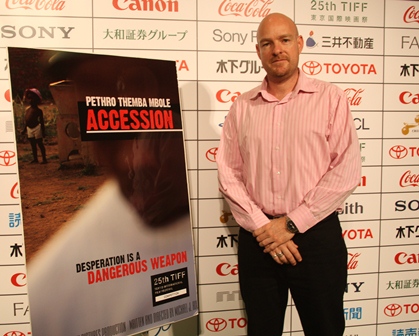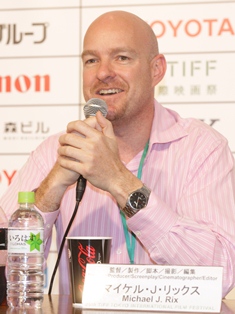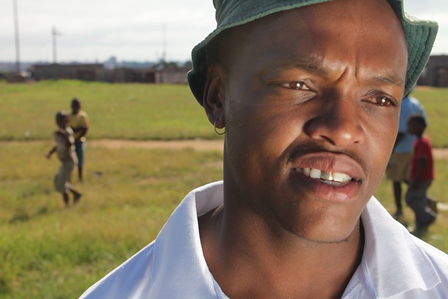Competition Section “Accession” Press Conference: Notes & Quotes
Date & Time:
October 23rd (Tuesday), from 16:30 @Movie café
Appearance:
Michael J. Rix (Director/Producer/Screenplay/Cinematography/Editor)

Michael J. Rix (MJR): Thank you for having me here. I’m having a fantastic time and it’s great to be in the Competition. I haven’t had time to see the city but I’ve been watching a lot of the Competition films.
Q.For this year’s Competition films, we tried to select films of directors with strong personalities. I feel that your film was one of the most extreme ones. What triggered you to depict this theme?
MJR:I hope this film doesn’t depict my personality! This is an issue that we deal with in South Africa which I believe has never been put on film. It was an issue that I had to get out there because back home, we tend to ignore this issue. It’s occasionally in the papers and we know it’s happening but nothing is being done.
Q:Where is this film staged in?
MJR:We shot the film in a community very much like the one we are depicting. We researched beforehand within that community—we interviewed a lot of people there just to get a feel for the place we were illustrating. We interviewed people who knew someone who had gone through this experience. We tried to keep it as realistic as possible to shoot it on location and to reflect it as it happens.
Q:Why was there only one small scene was night time and the rest day time?
MJR:I wanted to depict‘a day’. It starts at sunrise and ends just before sunset. Eventually that structure broke up a little bit to allow for one night time scene that we needed for the part in front of the fire. But besides that, it’s sort of a straight narrative from start to finish.
Q:The film had a unique use of color. It starts off with a colorful goose but color fades away to an almost monotone at the end. Did you have any creative thoughts about how to screen the images?
MJR:That was intentional light from the beginning. It was a technique that I wanted to try to see if it would have an emotional effect. There’s a slow drain of color from the first frame of the film to the last frame of the film and that seemed to be effective. It’s sort of a draining of the emotions of the audiences at the same time.
Q:How was it being the director, producer, screenplay, cinematographer, and editor of a film?
MJR:I ended up doing five roles for this film. The biggest difficulty in doing this was trying to get it financed. That’s why I eventually took on many roles because the budget got smaller and smaller. I spent a lot of time working with the actor. He’s not a professional actor. To try to get such a demanding performance out of him took time. We did a lot of rehearsals and built the character from inside out. I scripted his role to a certain degree but gave him a lot of freedom to improvise on his part so he could use his own dialogue. I met this actor at a short movie film project where he was one of the actors. He was good so I wanted to work with him on something bigger.
Q:Could you tell us about where you got the music for the film?
MJR:I didn’t want to use any cinematic tricks like a Hollywood film would do. I used music for the end credit because I thought it was too silent for the audience with nothing there. The choice of music was difficult because you can’t change the tone for the audience at the end. So I just kept with something very ‘unmusical’ and dark. I happened to find two pieces of royalty free music on the internet, so I got lucky.

Q:The movie is very uncomfortable in terms of the level of intimacy. What did you have in mind to shoot the character so up close and in our face?
MJR:It was a technique I decided on midway through the process. It became the most effective way to put the issue out there—forcing the audience to live with this person, that you need to live with him or leave.
Competition
Accession

Director:
Michael J. Rix
Cast:
Pethro Themba Mbole
Vusumuzi Ndumo




















